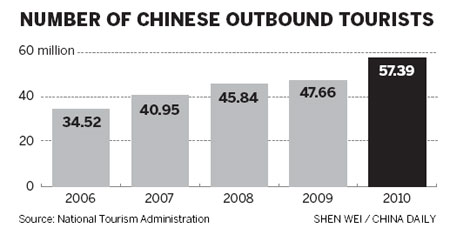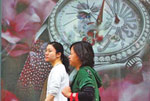Holiday to be boon for places overseas
Updated: 2011-09-30 09:17
By Tan Zongyang (China Daily)
|
|||||||||||

BEIJING - Even as some travel destinations struggle to attract tourists, flocks of Chinese are expected to go overseas during the National Day holiday, according to the country's top tourism think tank.
The China Tourism Academy, a research institute, forecasts that 2.2 million Chinese tourists will travel overseas during the weeklong holiday that starts on Oct 1.
The number of outbound tourists is expected to increase by a double-digit percentage above what it was in the same period this past year, the academy said. And travelers during the holiday are expected to spend $950 each on average, or $2.1 billion in total.
"Outbound travel has become more attractive to the Chinese since some overseas destinations are not as expensive as domestic resorts, which are usually not comfortable places to visit because too many people go to them during the holiday," Dai Bin, head of the academy, said in an interview with China Central Television.
According to the academy, the Maldives, Phuket Island in Thailand, Bali Island in Indonesia, Hong Kong and South Korea are expected to be among the destinations preferred by Chinese mainland tourists during the holiday.
They will be popular because they can provide both good accommodations and tax deductions to Chinese tourists who buy luxury goods. Dai also noted that such places are offering more services in Mandarin.
The holiday boom in travel has also helped the tourism industry to regain some of the momentum it lost during a year of natural disasters and political turmoil.
"For the month of October, we have seen better sales of tours to Japan," said Yao Yao, marketing manager with the Beijing-based tour company China Comfort Travel.
Yao said the country is recovering gradually from the devastating tsunami that hit its northeast coast and damaged a nuclear power plant in March, leading to a radiation leak. That steady improvement has helped to alleviate the public's fears about traveling in the country.
Dong Xiang, deputy manager of China Travel Service's outbound tourism department, said the number of tourists who plan to go to Japan in October exceeds the number who went in the past three months, although it is still far below the number of tourists who went to Japan in October 2010.
"The market has not completely recovered," Dong said. "But it has bounced back more quickly than we thought."
Egypt, which was once the most popular destination in Africa among the Chinese, has also had trouble attracting tourists. Rather than disasters, though, its difficulties stem from unstable politics.
Wang Di, manager of the Beijing Tourism Group's Middle East and Africa tourism department, said it has been difficult in recent times to sell tours to Egypt.
"Clients think it's not wise to travel to a country where a government authority has not yet established," Wang said.
Even so, Wang said tourists, rather than abandon their travel plans, will usually travel to alternative destinations. In Africa, that tendency has been a boon to countries such as Kenya and South Africa.
Last year, the number of Chinese travelers going overseas hit 57.39 million, which was up by 20.4 percent above the number for the previous year, according to the China National Tourism Administration.
According to the Pacific Asia Travel Association, a non-profit travel trade association in the area, travelers in China spend $55 billion abroad every year. Fifteen years ago, the figure was $8 billion.
In 2010, China came in fourth in a ranking of countries whose citizens spend the most in their overseas travels.
Yu Ran contributed to this story.
Related Stories
Golden Week boost for Taiwan tourism 2011-09-15 13:38
China, India to give Australia's tourism a lift: Experts 2011-09-05 15:56
Vice-Premier Wang calls for tourism development 2011-09-02 13:24
HK shop rents to soar as tourism booms 2011-08-23 11:37
- Holiday to be boon for places overseas
- Rebate may draw crowds to Hainan
- ANZ plans 'significant' investment in China
- Full-blown economic crisis unlikely
- Bumper crop, but price still rising
- Huaneng seeks larger presence
- Social network websites 'pose a challenge'
- Tight electricity supply to return during winter













